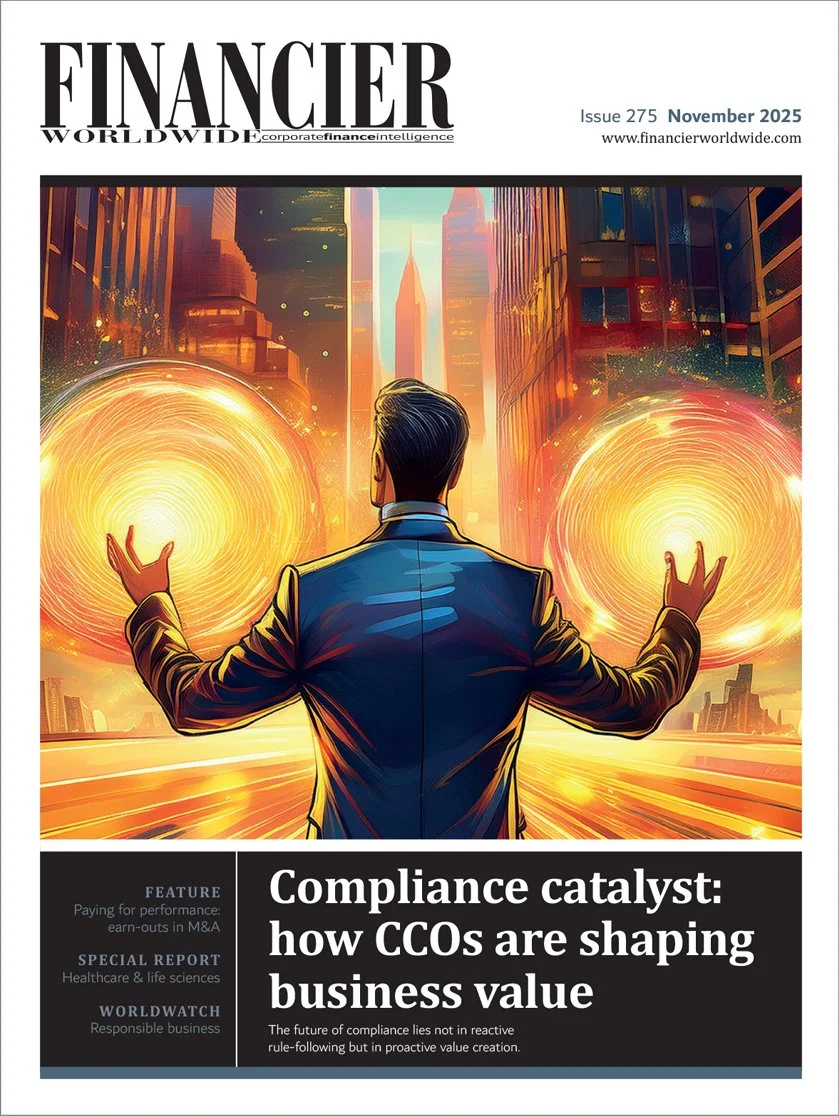Optimising tax reporting
November 2025 | TALKINGPOINT | CORPORATE TAX
Financier Worldwide Magazine
FW discusses tax reporting optimisation with Romain Tiffon at ATOZ Tax Advisers.
FW: What are the key trends and developments currently shaping the tax function within businesses? In your opinion, how urgently should organisations reassess their existing technologies and processes?
Tiffon: Tax functions are undergoing a profound shift, shaped by digitalisation, automation and the accelerating adoption of artificial intelligence (AI). Businesses are moving away from manual compliance toward data-driven strategic advisory. Regulatory complexity, real-time reporting requirements and growing demand for transparency are amplifying this shift. Unified data models and advanced analytics are emerging as critical enablers of resilience and efficiency. Against this backdrop, the urgency to reassess technologies and processes cannot be overstated. Many organisations still rely on highly fragmented systems, which create inefficiencies, compliance risks and missed opportunities for strategic insights. This is further amplified when AI is used, due to how generative AI models function. In today’s environment, delay carries a tangible cost, not only in terms of compliance exposure but also competitive disadvantage. By modernising workflows, adopting automation for routine tasks and integrating data platforms, tax functions have a significant opportunity to transform from compliance-focused units into value-driving partners that are intrinsically connected to the business.
FW: How would you assess the current global tax regulatory landscape in terms of its strictness and effectiveness? Which areas are tax authorities around the world prioritising?
Tiffon: The global tax regulatory environment has grown stricter and more complex over the past decade with the introduction of the anti-tax avoidance package within the European Union, and broader Pillar Two initiative. Authorities are increasingly demanding transparency, accuracy and real-time access to transactional data. This reflects not only compliance objectives but also broader policy goals around curbing tax evasion, addressing base erosion and ensuring fair contributions across jurisdictions. Effectiveness is being enhanced by the widespread adoption of digital reporting tools and the push toward e-invoicing and standardised filings. Areas of priority include, notably, transfer pricing (TP), as well as direct and indirect tax compliance. Tax authorities are also placing emphasis on leveraging digital tools themselves, which reduces tolerance for errors and delays on the corporate side. For businesses, this means stricter enforcement and reduced room for flexibility. Organisations must invest in compliance-ready systems and robust governance frameworks to meet today’s regulatory expectations and withstand tomorrow’s growing scrutiny.
FW: How are tax functions being modernised in practice? What steps can businesses take to effectively select, budget for, implement and maintain the right technologies to ensure accurate tax reporting?
Tiffon: Tax functions are modernising by embedding technology into every stage of the compliance, and possibly, the advisory process. Routine tasks such as reconciliations, data gathering and reporting are increasingly automated, enabling professionals to focus on higher-value activities such as risk assessment and strategic planning. Businesses selecting new technologies should begin with a clear diagnostic of current pain points, then align technology choices with broader finance and operational goals. Budgeting should be treated as an investment in efficiency and risk reduction rather than a cost centre. Implementation works best when phased, so, once a mapping exercise has been completed, we would recommend piloting tools within specific tax areas before scaling more broadly. Importantly, governance and change management must be prioritised to ensure adoption and sustainability. Maintenance requires ongoing training, monitoring vendor updates and regularly evaluating systems. By following a disciplined approach, organisations can ensure not only accurate tax reporting but also improved agility and alignment with evolving business strategies.
“A blended model allows tax functions to stay compliant, agile and cost-efficient under financial pressure.”
FW: How critical is high quality, well-structured data for enabling real-time reporting, audit readiness and informed decision making?
Tiffon: High-quality, well-structured data within a coherent unified data set is the foundation of modern tax operations. Real-time reporting, audit readiness and informed decision making all rely on seamless integration across enterprise resource planning (ERP) systems, payroll platforms and external data sources. Without a unified and reliable data model, organisations face significant risks, including inconsistent reporting, regulatory non-compliance and a lack of insight into emerging tax exposures. Well-structured data, by contrast, enables automation of compliance processes, reduces error rates and ensures audit transparency. It also allows tax teams to conduct scenario planning and predictive analytics. This should, therefore, result in supporting proactive, rather than reactive, decision making. In an era where tax authorities increasingly demand immediate access to transactional data, poor data quality or data that is not readily available is no longer tolerable. Investing in data governance frameworks, cleansing fragmented data and establishing a ‘single source of truth’ should be viewed as strategic imperatives. Ultimately, data maturity determines whether tax functions remain compliance-driven or evolve into strategic advisers.
FW: What impact are budget constraints having on tax functions? Are financial pressures driving more businesses to co-source tax operations with external providers?
Tiffon: Budget pressures are forcing tax functions to balance cost efficiency with rising compliance and regulatory demands. This is driving greater reliance on automation to reduce manual and repetitive work and free resources for strategic activities. However, financial constraints also mean that many organisations cannot justify large-scale in-house investment in technology or talent. As a result, co-sourcing tax operations with external providers is gaining traction. By leveraging external expertise, businesses can access advanced technology platforms, specialised skills and scalable support without bearing the full cost of ownership, while retaining the ability to co-develop the platform to make it perfectly adapted to internal operations, thereby unlocking significant value. Co-sourcing is particularly attractive in areas such as indirect tax, TP documentation and real-time reporting, where regulatory requirements are intensifying. While cost reduction is a key driver, resilience and quality assurance are equally important outcomes. A blended model, where organisations retain strategic control but outsource operationally intensive tasks, allows tax functions to stay compliant, agile and cost-efficient under financial pressure.
FW: What practical advice would you give to businesses looking to streamline their day-to-day tax activities to boost efficiency, resilience and scalability?
Tiffon: To streamline tax operations, businesses should first target repetitive, manual processes such as reconciliations, filings and data collection for automation. Integrating tax workflows into ERP systems reduces duplication and accelerates reporting cycles. Second, tax teams should focus on building a unified data model that connects tax information with finance, payroll and external systems. This not only improves compliance accuracy but also supports strategic analysis. Third, upskilling is critical. Tax professionals must become proficient in digital tools, data interpretation and cross-functional collaboration. From an operational standpoint, businesses should embrace process standardisation and documentation to ensure resilience and scalability. Finally, governance cannot be overlooked and should lead to defining clear frameworks for risk management and audit readiness, with a view to minimising compliance exposure. Taken together, these measures reduce costs, enhance efficiency and position the tax function as a forward-looking partner to the wider business, and by the same token, position it as a genuinely value-creating function.
FW: Looking ahead, how do you see digital transformation and the accelerating pace of regulatory change affecting tax functions? What are likely to be the main challenges facing tax leaders in the foreseeable future?
Tiffon: The pace of digital transformation and regulatory change will continue to reshape the tax function. Automation and AI will increasingly handle compliance and reporting, while tax professionals focus on interpretation, strategic planning and advisory roles. Real-time reporting, predictive analytics and seamless integration with business operations will become standard expectations. However, the road ahead is not without challenges. The most pressing include managing fragmented data landscapes, maintaining compliance across multiple jurisdictions and ensuring data security in the age of AI. Talent also remains a constraint. Tax teams must rapidly develop hybrid skillsets that blend technical expertise with digital fluency. Financial pressures may further complicate investment decisions, pushing organisations to adopt flexible sourcing models. For tax leaders, the challenge lies in balancing compliance excellence with strategic contribution, as well as building functions that are both resilient to disruption and capable of driving long-term business value.
Romain Tiffon is a partner within the international & corporate tax team at ATOZ Tax Advisers. A tax professional since 2006, Mr Tiffon has experience in structuring pan-European alternative investment funds across all asset classes, as well as coordinating tax structuring advice and implementation for a wide range of institutional investors. He also has extensive experience in structured finance, M&A transactions and sovereign wealth funds, and is currently responsible for ATOZ’s DAC6 and other technological initiatives, working closely with ATOZ Solutions. He can be contacted on +352 26 940 245 or by email: romain.tiffon@atoz.lu.
© Financier Worldwide




